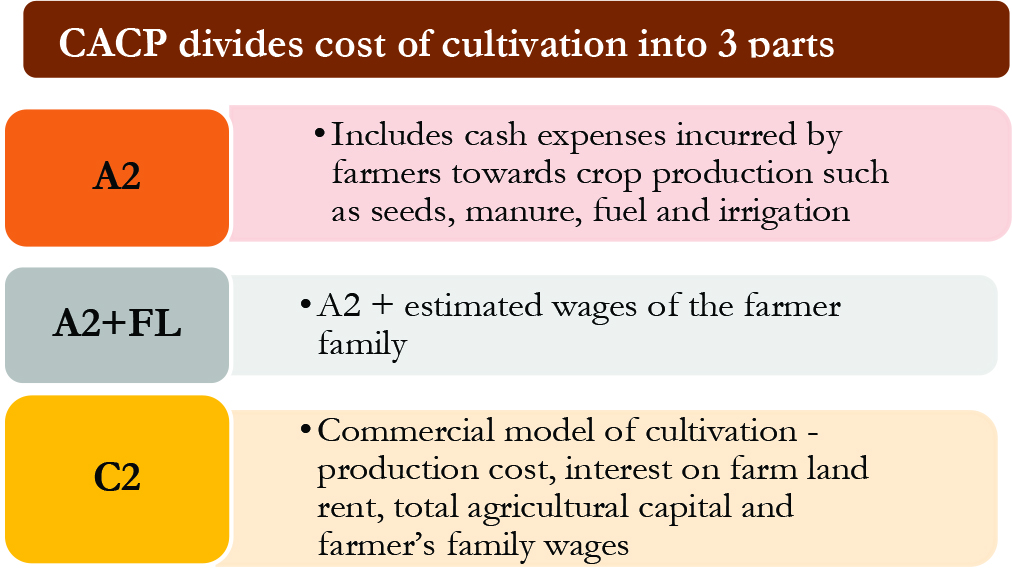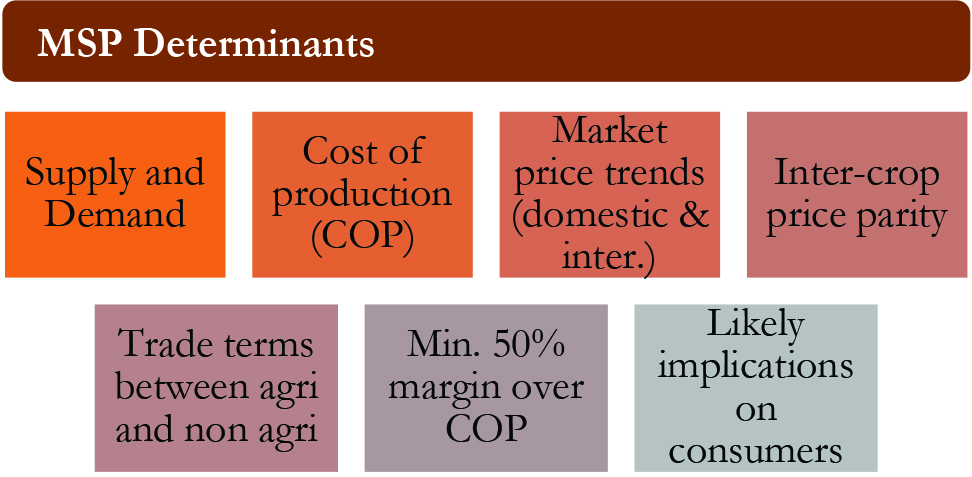
Should Minimum Support Price (MSP) be guaranteed by law?
The Minimum Support Price (MSP) system, an important price signal was introduced in order to protect the interests of the farmers as a tool for the government to control fluctuations in crop prices. MSP calculation is an administrative exercise without any legal obligation. The government decides on the MSP for 23 crops currently covered under the program based on the recommendation of Commission of Agriculture Cost and Prices (CCAP). These 23 crops (including 7 cereals and oilseeds each, 5 pulses and 4 commercial crops) contribute to more than 80% of the country’s production. According to CCAP report A2+FL model is the one used for current MSP calculations.
exercise without any legal obligation. The government decides on the MSP for 23 crops currently covered under the program based on the recommendation of Commission of Agriculture Cost and Prices (CCAP). These 23 crops (including 7 cereals and oilseeds each, 5 pulses and 4 commercial crops) contribute to more than 80% of the country’s production. According to CCAP report A2+FL model is the one used for current MSP calculations.
MSP being an important policy tool has helped the government to control the growth of crops that are low in production, benefited farmers with assured returns and achieve food self-sufficiency. With assured income farmers are willing to diversify and invest in other crops which helps the government to improve supply of other crops at affordable prices lower the market rates. Over the last decade the MSPs for these crops have doubled, but still it is not enough to maintain the price parity in the market. Yet precisely only 6% of the farmers today are direct MSP beneficiary out of which majority are from Punjab and Haryana. The year on year growth does not match up to the inflation rates, as it primarily ranges between 1 – 5% except for oilseeds where it is 8%-9%. According to a National survey only 13.5% paddy growers and 16.2% wheat growers are actually receiving MSPs. The dispute lingers on government preferring A2+FL over C2 model for calculation. For example for wheat the MSP is calculated as INR 2830/quintal by C2 and INR 2015/quintal by A2+FL. Nevertheless, the declared MSP helps to maintain the price parity in the market and avoid buyer control over prices.
 Moreover, the whole debacle about MSP and making it a law has its own pros and cons. Though cost of production is an important factor in determining MSP, several other factors govern MSP determination. In addition to maintaining the supply and demand of different crops MSP prevents the monopoly of private players. Nonetheless, support to farmers in the form of MSP and making it mandatory is market-distorting since it does not appropriately consider demand side implications, international prices and export competitiveness. Exports will become non-competitive since government procurement prices are much higher than prevailing market prices and with this the government might end up as the sole buyer of the produce. With the government already procuring huge and unmanageable quantities of rice and wheat, making MSP mandatory will be a superfluous burden on the government. Today the government holds wheat and rice federal stocks which is almost 1.8 – 2.3 times of food security norms. MSP is funded by tax-payers and excessive MSP based procurement will put additional burden to the tax payers.
Moreover, the whole debacle about MSP and making it a law has its own pros and cons. Though cost of production is an important factor in determining MSP, several other factors govern MSP determination. In addition to maintaining the supply and demand of different crops MSP prevents the monopoly of private players. Nonetheless, support to farmers in the form of MSP and making it mandatory is market-distorting since it does not appropriately consider demand side implications, international prices and export competitiveness. Exports will become non-competitive since government procurement prices are much higher than prevailing market prices and with this the government might end up as the sole buyer of the produce. With the government already procuring huge and unmanageable quantities of rice and wheat, making MSP mandatory will be a superfluous burden on the government. Today the government holds wheat and rice federal stocks which is almost 1.8 – 2.3 times of food security norms. MSP is funded by tax-payers and excessive MSP based procurement will put additional burden to the tax payers.
A single law endorsing minimum threshold price for procurement of farm produce will be tough to implement and may not be the solution. Subsequently, increasing and/or mandating the MSP alone does not address the problem. The MSP based procurement system needs to be strengthened with establishing an adequate number of APMC Mandis and vesting them with requisite powers. Future policy governing MSP needs to be much more consultative rather than just being expert opinion driven to appropriately factor in all such determinants.
Author:

Connect with Authors at: E-mail agribusiness@sathguru.com
 Grow Beyond
Grow Beyond 

